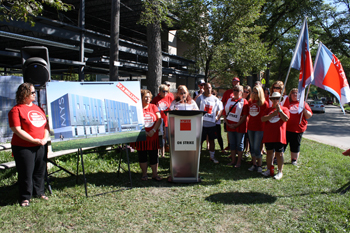The MGEU is disappointed to announce that following a conciliation session yesterday, a deal has yet to be reached and Macdonald Youth Services (MYS) Crisis Stabilization members (Local 221) continue to be on strike.
Today marks the eleventh day of the strike, and yesterday the MYS Bargaining Committee met with the employer at Conciliation and Mediation services, in hopes of reaching an agreement and ending the strike. After more than two years, the employer came to the table and still failed to make an offer of any kind, leaving members frustrated and still on the picket line.
“These
members provide a vital public service to vulnerable teens, and these kids need
them,” said MGEU President Michelle Gawronsky.
The
Union is asking for a very modest 2% annual increase, similar to what other
members doing the same work have already received. This is 0.08% of the approximately $29
million MYS operating budget.
The
employer has publicly supported this wage increase in the media, but new
information throws their sincerity into question.
Documents
obtained by the MGEU show MYS gave their CEO a 6% raise over the past two years
and their Director of Business Operations, the lead negotiator who keeps
insisting that they can’t afford a modest raise, a 9% increase over the past
two years. These are the same two years over which these front-line workers
have worked without a contract.
“Our
members are caught in a political dispute between the government and their
employer. They are being used as pawns,” said Gawronsky. “There
seems to be money for everyone but the front-line staff. There is $7.5 million for the new MYS
headquarters under construction, money for raises for senior officials at MYS,
and enough to give the Premier a raise.”
Gawronsky posed two simple questions to MYS:
1.If you can give raises of 6% and 9% to your CEO and senior manager, why can’t you make a fair and reasonable offer to your front-line staff?
2.Why can’t we just put this contract before an independent arbitrator so that full services can resume, front line staff can go back to work, and kids in crisis can get the services they need?”

